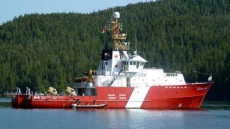TORONTO - A prominent law professor is urging the federal government to terminate an American company's licence for a Canadian-made Ebola vaccine.
The company, NewLink Genetics, doesn't have the capacity to develop the much-needed vaccine, argues Amir Attaran, a professor of law and population health at the University of Ottawa.
"The mistake Canada has made has been to keep this bad marriage with NewLink and try to make it better. Canada should either be terminating the licence agreement outright or simply issuing another licence on non-commercial terms to someone else," Attaran told The Canadian Press in an interview.
"Either of those would work. Neither of them have been done. And that's absolutely shameful."
Brian Wiley, NewLink's vice president for business development, said in an email that the company would not comment on Attaran's suggestion.
Attaran said he has written to federal Health Minister Rona Ambrose outlining why he believes Canada should strip NewLink of the vaccine licence. Her department's press office did not immediately respond on Monday to queries about Attaran's proposal.
Canada began shipping 800 vials of the vaccine to Geneva on Monday, having donated the vaccine to the World Health Organization. The donated vaccine will be used in clinical trials aimed at determining whether it is safe to use in people and what an effective dose is.
The vaccine, known as VSV-EBOV, was designed by scientists at the National Microbiology Laboratory in Winnipeg. It was licensed to NewLink, of Ames, Iowa, in 2010. NewLink's chief focus is the development of cancer vaccines.
At the time, Canada's options for commercializing the Ebola vaccines or drugs its scientists were developing were limited. Prior to this outbreak, fewer than 3,000 people had been known to have been infected with Ebola, in sporadic outbreaks in poor African countries over a period spanning nearly 40 years.
The prospects for recouping the considerable costs of developing and licensing a drug or vaccine were nil. The major players in the pharmaceutical world — those with deep pockets and regulatory know-how — weren't interested.
It appears from filings the company made with the U.S. Securities and Exchange Commission that NewLink paid merely $205,000 for the rights to the vaccine, Attaran said. The company is also required to pay Canada royalties — the rate will be in "the low single-digit percentage" of the price — on sales of the vaccine.
Many of those involved in charting the Ebola response believe an effective vaccine will be needed to bring this raging epidemic under control. And although another — made by scientists at the U.S. National Institutes of Health — is further along in the testing process, many scientists point to the Canadian vaccine as the better option.
For one thing, the Winnipeg-designed vaccine is expected to require only a single dose. It is thought the American vaccine will require a priming dose followed by a booster with another vaccine that will serve to stimulate the immune system.
A two-dose regimen — with two different vaccines — would be hugely challenging to deliver, especially in countries where the health-care systems have collapsed under the weight of the Ebola outbreak.
As well, in studies in primates the Canadian vaccine was shown to be effective at both protecting against infection and mitigating the severity of the disease when given after an animal was infected. There are no data to suggest the American vaccine would work in both pre- and post-exposure scenarios.
Because of these advantages, many are eager to see VSV-EBOV tested and to see the scale up of production of the vaccine.
But the fact that the licence is held by a small company with no experience bringing a product through the regulatory process and with no vaccine production capacity of its own is seen to be impeding the ability to make, test and — if it is safe and effective — eventually disseminate the vaccine in Ebola-affected countries.
The first human clinical trial of the vaccine began last week in Bethesda, Md. It had been expected that it and other trials would have begun weeks earlier, but there were delays that people knowledgeable about the process attribute to NewLink's size and inexperience.
In its most recent annual report, filed on March 31 of this year, its Ebola vaccine appears to be almost an afterthought, rating only a single mention. NewLink described itself as a "development stage company" and noted that it has incurred significant losses since its inception. At the end of 2013, the company's accumulated deficit was $136 million.
The company has been receiving significant assistance from the Biomedical Advanced Research and Development Authority, a branch of the U.S. Department of Health and Human Services that fosters development of drugs and vaccines for bio-threats like pandemic influenza and anthrax.
The contract between Canada and NewLink gives the Canadian government some options it could employ if it believes NewLink lacks the capacity to develop the vaccine. And Attaran insisted the government should have exercised one of these options before now.
"West Africa is burning, he said. "It is past time that Canada terminate the contract with them (NewLink)."
Attaran noted that in the four years since it acquired the licence to the vaccine, NewLink had not conducted a single human trial with it until now.
In the licence agreement, Canada retains the ability to make or have made the vaccine for use in Canada during an emergency.
It also has the right to let other manufacturers make the vaccine for use in other countries "for compassionate care purposes" if NewLink has not received regulatory approval for the vaccine in the target country. At the current time NewLink has not received regulatory approval for VSV-EBOV anywhere.





